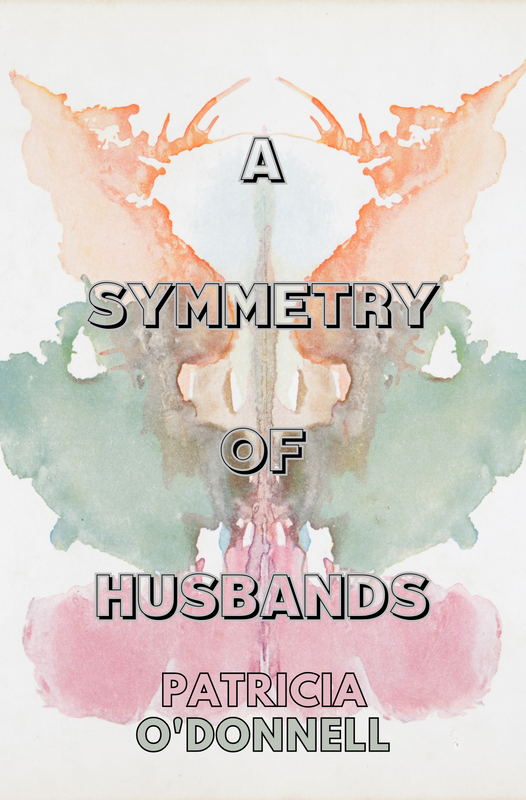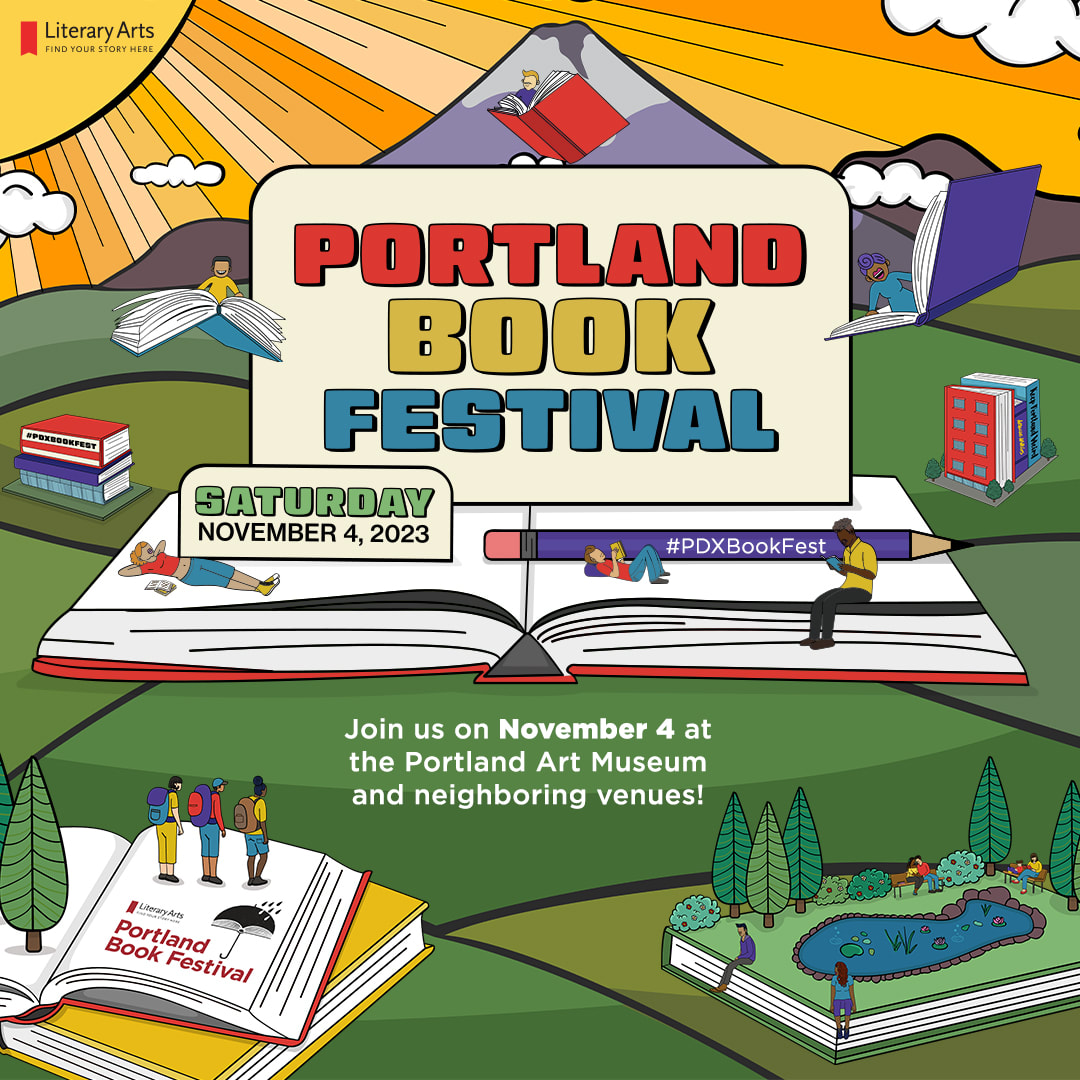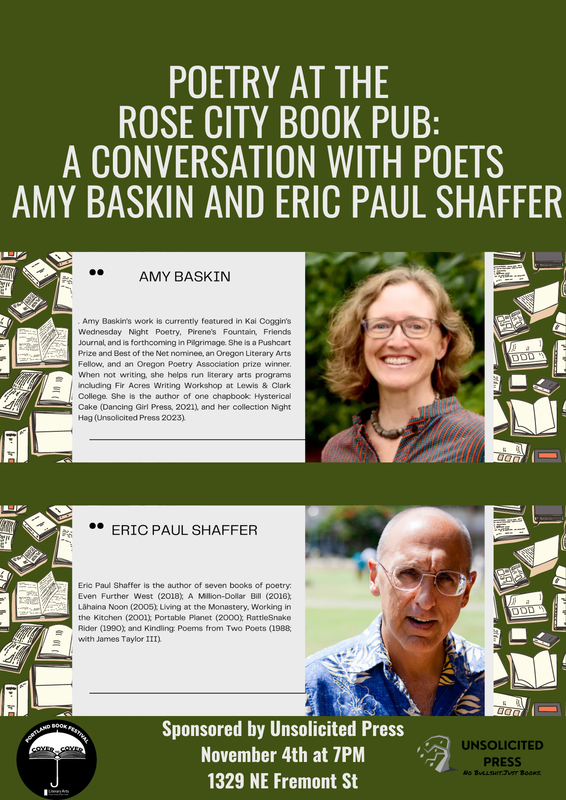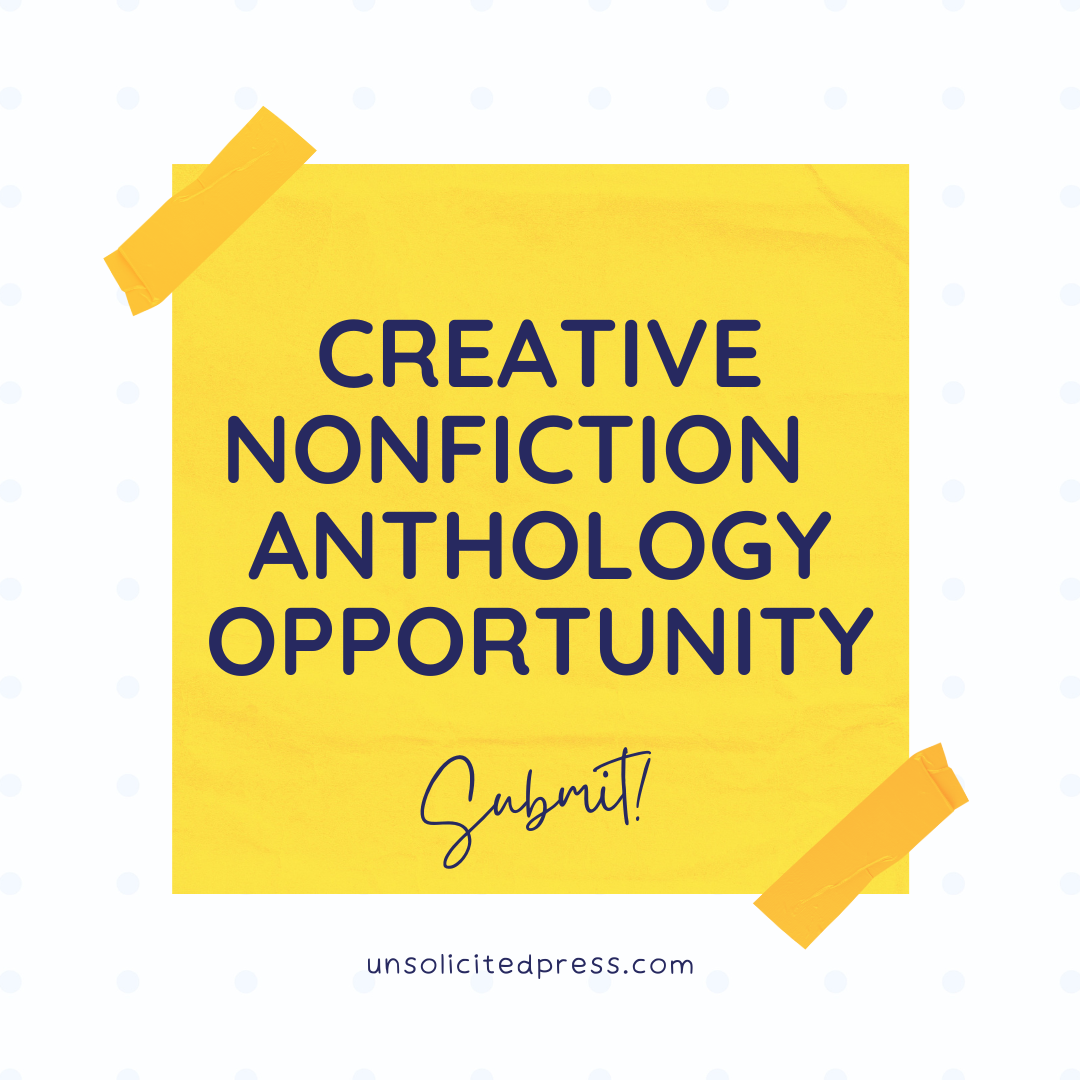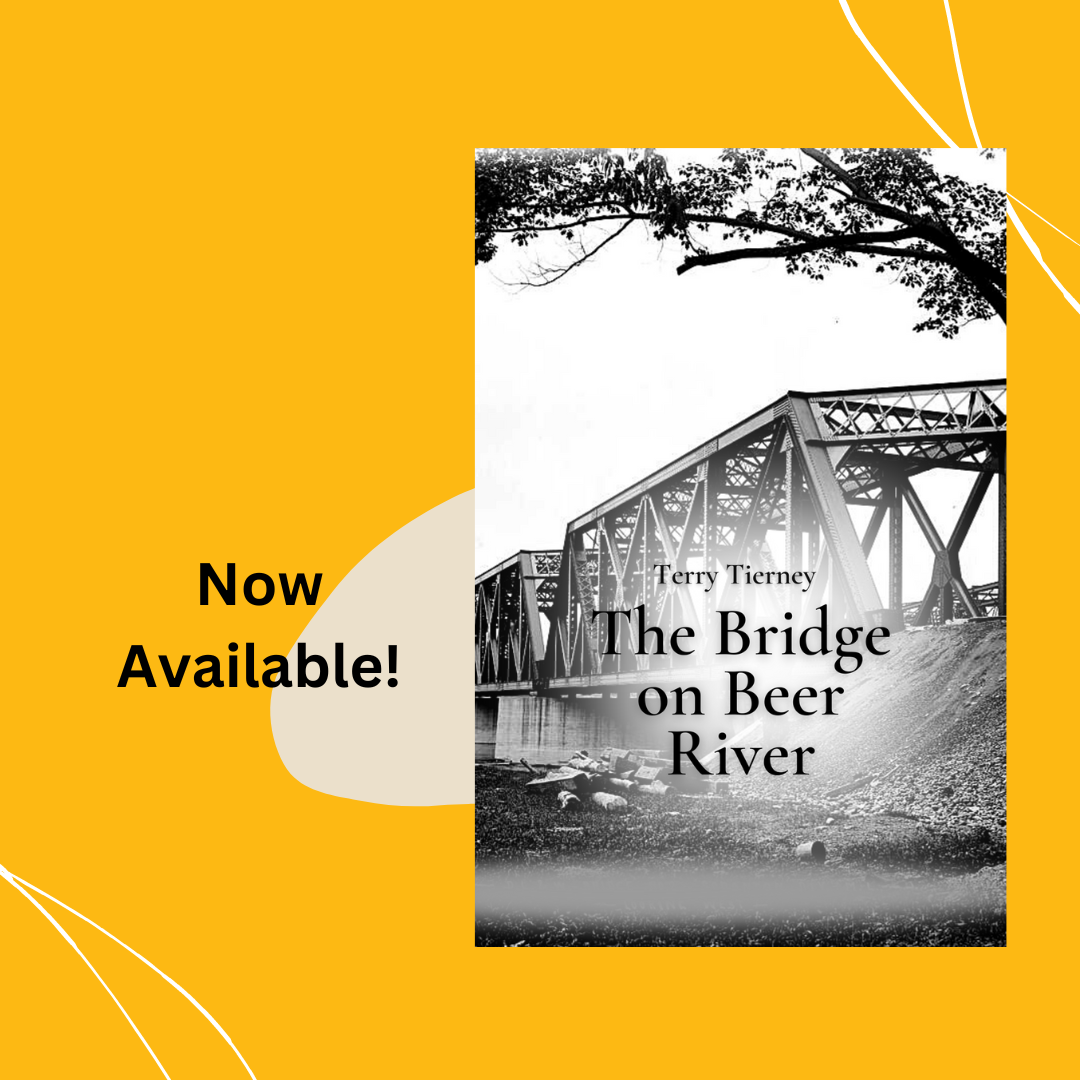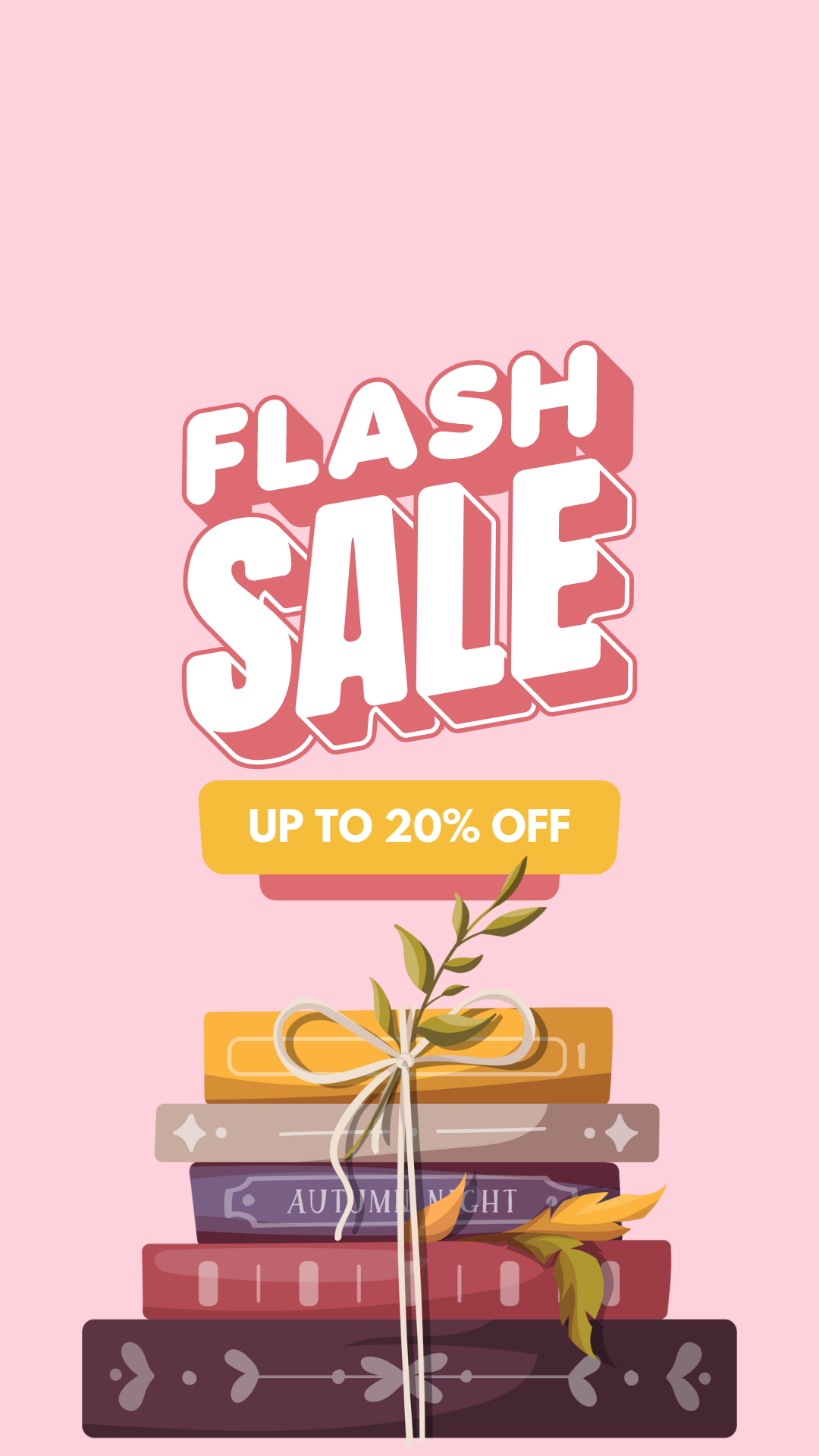Unsolicited Press
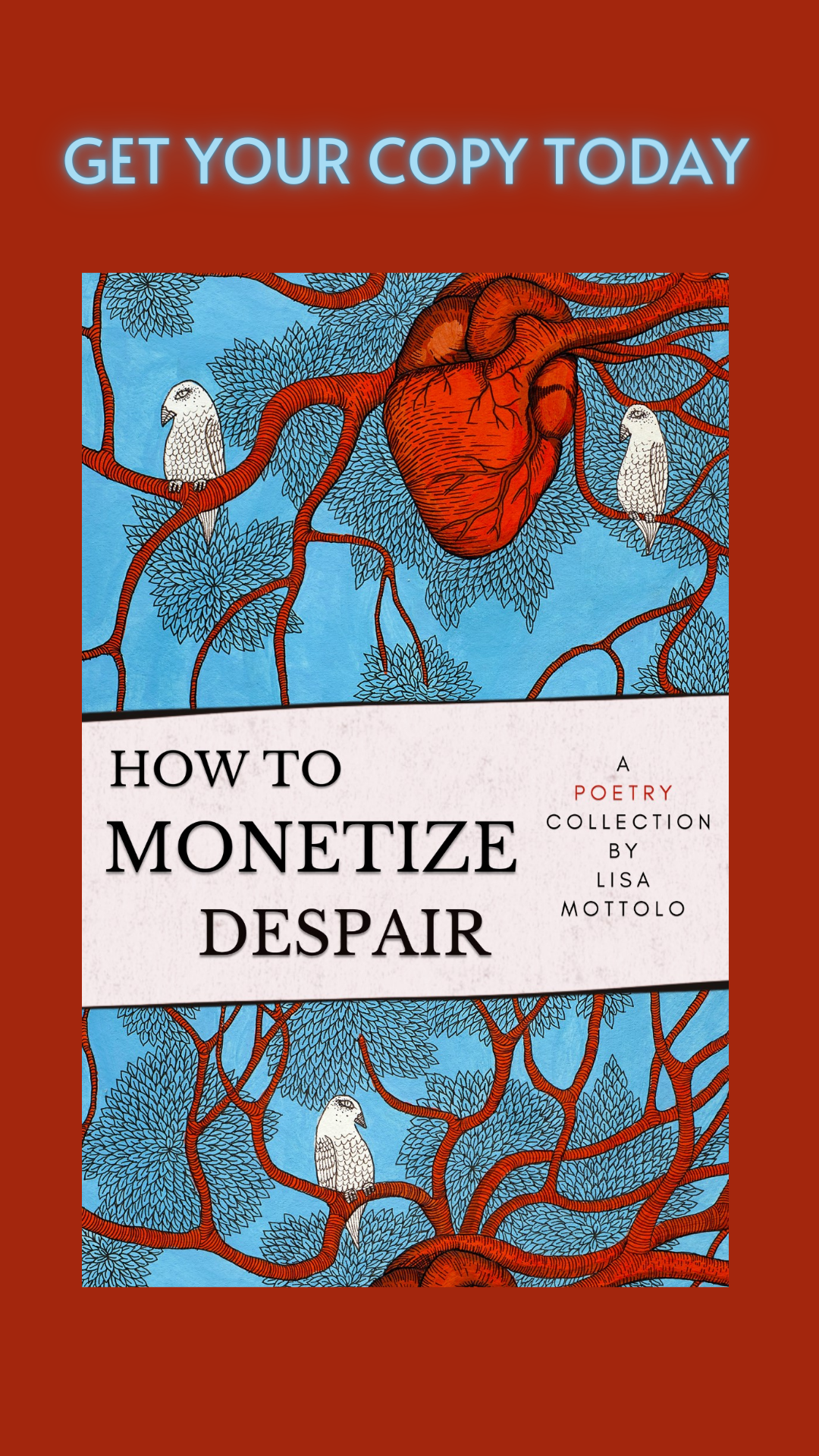 Lisa Mottolo’s How to Monetize Despair transforms devastation into clean-burning fuel, complicating and ultimately exploding the concept of self-help. These poems are dark, playful, and surreal, examining the threshold between life and death, juxtaposing flourishes of nature with vulnerabilities of the body and things we leave behind. In “Destroying a Flower” the speaker observes, “It’s funny, we see fleetingness as sad / as though it would be good if everything lasted forever, // giving us enough time to get sick of everything.” How to Monetize Despair is a stunning debut from a poet with remarkable range. ---Mary Biddinger, author of Department of Elegy “Here is a poet sparring in the darkness--bloodied fists swinging through empty midnight air and somehow landing every punch in every poem.” ---Dan Sicoli, Co-editor of Slipstream and author of Pagan Supper “Mottolo writes for us the self-help book we most deserve: it doesn’t make us better than, but reveals who we are… “A ruby-throated hummingbird came up the window / and I missed it because I was reading a poem about God.” Even our effort to be good divorces us from the good. And yet—and yet these poems are so profoundly tender in their unsparing insights that the book reads not as an indictment, but a strange book of innocence.” ---Dan Beachy-Quick, Poet, Writer, and Critic How to Monetize Despair is a captivating exploration of a wide range of subjects and ideas, from traumatic loss and the sorrows of human relationships to the natural but absurd world of neurotic caterpillars and philosophical cockroaches. With a unique blend of imagery, self-help inspired titles, and Mottolo’s peculiar brand of humor, this collection takes readers on a one-of-a-kind journey through human experience. This collection is a must-read for anyone seeking to explore the complexities of trauma and struggle, and to encounter a sea creature or butterfly along the way. ABOUT THE AUTHOR Lisa Mottolo is a poet and essayist who splits time between Austin, Texas and Playa Flamingo, Costa Rica. She has attended writing programs at The University of California at Berkeley and Kenyon College, and is Assistant Editor at Atmosphere Press. Her work has appeared in Penn Review, DIAGRAM, and The Laurel Review, and How to Monetize Despair is her first book. A native of Schenectady, New York, she now lives with her husband, two children, one dog, one rabbit, and, of course, four birds. ABOUT THE PRESS Unsolicited Press strives to produce exceptional works of fiction, nonfiction, and poetry from award-winning authors. Unsolicited Press is based out of Portland, Oregon and focuses on the works of the unsung and underrepresented. As a womxn-owned, all-volunteer small publisher that doesn’t worry about profits as much as championing exceptional literature, we have the privilege of partnering with authors skirting the fringes of the lit world. We’ve worked with emerging and award-winning authors such as Shann Ray, Amy Shimshon-Santo, Brook Bhagat, Kris Amos, and John W. Bateman. Learn more at unsolicitedpress.com. Find us on twitter and Instagram, @unsolicitedp. HOW TO MONETIZE DESPAIR is available on December 12, 2023 as a paperback and e-book (all major retailers). Retailers, schools, and libraries can order copies through Ingram. The author is open to speaking with the media, holding readings, and engaging in other author opportunities.
Goodness, do we love a great book deal. We have tons of books that are discounted are a variety of retailers. Currently, these books are on sale on our Bookshop.org bookshop page. Check them out.
Find More Books You Love"Patricia O’Donnell writes unfailingly about the rawness of human relationships with this investigation of contradiction, grief, hope, and memory. With her sparse prose, stark honesty, and grit, O’Donnell lays bare the complexities of love, infidelity, and friendship. A Symmetry of Husbands is a poetic unfolding of love in all its expressions."
Amy Neswald (her collection I Know You Love Me, Too is out from New American Press) Set in the early days of the Trump presidency, A Symmetry of Husbands probes the inner workings of marriage and long friendship. As she grieves the death of her friend, Megan, Abigail struggles with complicated feelings of lingering desire for Megan’s husband, and guilt over their affair. Abigail also entertains a growing suspicion of the circumstances of Megan’s death, and her own possible complicity. ABOUT THE AUTHOR Patricia O’Donnell lives in the small town of Wilton in central Maine. She has ties to Boston’s North Shore, where the novel is set. She is Professor Emerita in Creative Writing at the University of Maine at Farmington. Her books include a prize-winning collection of short fiction, a memoir, and two previous novels. ABOUT THE PRESS Unsolicited Press strives to produce exceptional works of fiction, nonfiction, and poetry from award-winning authors. Unsolicited Press is based out of Portland, Oregon and focuses on the works of the unsung and underrepresented. As a womxn-owned, all-volunteer small publisher that doesn’t worry about profits as much as championing exceptional literature, we have the privilege of partnering with authors skirting the fringes of the lit world. We’ve worked with emerging and award-winning authors such as Shann Ray, Amy Shimshon-Santo, Brook Bhagat, Kris Amos, and John W. Bateman. Learn more at unsolicitedpress.com. Find us on twitter and Instagram, @unsolicitedp. A SYMMETRY OF HUSBANDS is available on November 7, 2023 as a paperback (306 p.; $18.95; 978-1-956692-83-9) and e-book (all major retailers). Retailers, schools, and libraries can order copies through Ingram. The author is open to speaking with the media, holding readings, and engaging in other author opportunities. We will be at the Portland Book Festival on the evening of 11/3 and all day 11/4. We are table #69 — if you are in the city, please consider swinging by and saying hi to our staff! Our publisher, a few interns, and many of our PNW authors will be at the table. For those who can stop by in person, we will be giving you a free book with every purchase. We are largely representing our PNW authors during the festival, with a few new releases on the table. Last year we ran out of books so we are prepared to place online orders that can be shipped directly to your house if that happens. Here are some of the books that we will have available at the table: We are also offering a range of book deals for those of you who cannot be at the festival. You can find out about those through our Substack newsletter. It's a free newsletter and takes two seconds to subscribe. By the end of the year, that will be our main form of communication (yes! we are retiring the blog). Not only that, but several authors will be waiting to sign books for you. On Friday evening, Eric Paul Shaffer and Amy Baskin will be at the table from 6pm-7PM.
For the all day event on Saturday, here is the author signing schedule:
In the Bodies is a collection of poetry for shapeshifting. The poems investigate possibilities of mutual transformation, as our relational encounters with others co-create meaning, poetry, environment, and even our bodies. What might we co-create when we press against the taught borders of body, of place, of time, of what is accepted as possible and holy? These poems press, inviting readers to get in the bodies of other creatures, people, and places—to taste what melts their tongues, feel their bone breaks, scry through their eyes, sense the world rotating through their dirt and updrafts, shift shape, and maybe sprout new growth together in shared gardens.
ABOUT THE AUTHOR Jericho M. Hockett's roots are in the Southwest Kansas farm, while she blooms in Topeka with her family. She is a poet, social psychologist, teacher, forever student, and dreamer, most whole in the green. Some of her poems appear in or are forthcoming from Drunk Monkeys, Earth’s Daughters, Yellow Arrow Journal, Coffin Bell, and Pilgrimage Magazine. Her chapbook “Rituals for Dissolution” is forthcoming (Eastern Iowa Review/Port Yonder Press). More works are always brewing. Instagram: @jerichomariette ABOUT THE PRESS Unsolicited Press strives to produce exceptional works of fiction, nonfiction, and poetry from award-winning authors. Unsolicited Press is based out of Portland, Oregon and focuses on the works of the unsung and underrepresented. As a womxn-owned, all-volunteer small publisher that doesn’t worry about profits as much as championing exceptional literature, we have the privilege of partnering with authors skirting the fringes of the lit world. We’ve worked with emerging and award-winning authors such as Shann Ray, Amy Shimshon-Santo, Brook Bhagat, Kris Amos, and John W. Bateman. Learn more at unsolicitedpress.com. Find us on twitter and Instagram, @unsolicitedp. IN THE BODIES is available on October 17, 2023 as a paperback (144.; 978-1-956692-76-1) and e-book (all major retailers). Retailers, schools, and libraries can order copies through Ingram. The author is open to speaking with the media, holding readings, and engaging in other author opportunities. 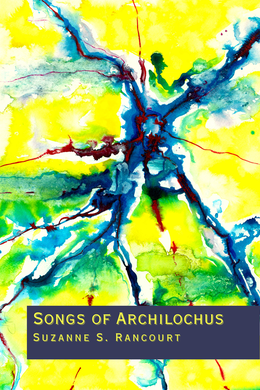 October 10, 2023 -- We are announcing the immediate release of Suzanne S. Rancourt's latest collection. Riding atop grief’s didactic waves, Rancourt skillfully writes in a variety of poetic forms that support the intimate melding of shared experience as healer, elder, and human being. Prose, lyric, ballad, couplets, and haiku inspired – Rancourt continues to push the boundaries of trauma. Songs of Archilochus is an odyssey of soul recovery over great distances, time, and place: a migration from moral injury to a momentary place of peace. It takes courage to age with grace. It takes courage to sing the songs that we have been given - but sing we must for that is how the healing is carried – that is how the stories take shape – how they become a part of history whether personal, societal, global, or Universal. Songs of Archilochus reminds us that the vibration of human life knows no border, boundary, box or cage. Warrior. Poet. Lovers. Sing. ABOUT THE AUTHOR Suzanne S. Rancourt – a poet / author / of Abenaki / Huron, Quebecois & Scottish descent – is a veteran of the U.S. Marine Corps and U.S. Army. Her books include Songs of Archilochus (Unsolicited Press, 2023); Old Stones, New Roads (Main Street Rag, 2021); murmurs at the gate (Unsolicited Press, 2019), winner of the 2023 Poetry of Modern Conflict Award; Billboard in the Clouds (Curbstone Books, 2004), awarded the Native Writers First Book Award. Rancourt was the May 2022 / 2023 guest artist at University of Michigan's New England Literature Program. She has also been the featured writer for the Sundog Poetry Center's VT event honoring the People of the Dawnland: Voices of Today and Tomorrow. Her poetry, non-fiction, and fiction have appeared in a host of journals and magazines, including The Massachusetts Review, The Brooklyn Review, River Heron Review, Tupelo Press Native Voices Anthology, Bright Hill Press 25th Anniversary Anthology, Muddy River Poetry Review, Ginosko, Journal of Military Experience, and Callaloo. ABOUT THE PRESS Unsolicited Press strives to produce exceptional works of fiction, nonfiction, and poetry from award-winning authors. Unsolicited Press is based out of Portland, Oregon and focuses on the works of the unsung and underrepresented. As a womxn-owned, all-volunteer small publisher that doesn’t worry about profits as much as championing exceptional literature, we have the privilege of partnering with authors skirting the fringes of the lit world. We’ve worked with emerging and award-winning authors such as Shann Ray, Amy Shimshon-Santo, Brook Bhagat, Kris Amos, and John W. Bateman. Learn more at unsolicitedpress.com. Find us on twitter and Instagram, @unsolicitedp. SONGS OF ARCHILOCHUS is available on October 10, 2023 as a paperback (110.; 978-1-956692-98-3) and e-book (all major retailers). Retailers, schools, and libraries can order copies through Ingram. The author is open to speaking with the media, holding readings, and engaging in other author opportunities. 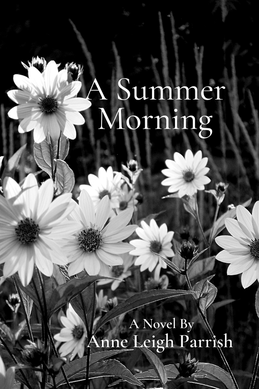 34-year-old Timothy Dugan faces a growing list of problems. His girlfriend wants to have a baby, he hates his job, and his mother announces that she and his father, long divorced, plan to remarry. There’s also his growing dependence on alcohol. Just when things start to look up, in the form of a possible new business venture, someone from his past returns with a secret that could ruin everything, and Timothy slides into a slow-motion train wreck from which he might not recover. ABOUT THE AUTHOR Anne Leigh Parrish lives in a forest in the South Sound Region of Washington State. She is the author of twelve books which include short stories, novels, and poems. She has recently ventured into the art of photography. Find her online at anneleighparrish.com. ABOUT THE PRESS Unsolicited Press strives to produce exceptional works of fiction, nonfiction, and poetry from award-winning authors. Unsolicited Press is based out of Portland, Oregon and focuses on the works of the unsung and underrepresented. As a womxn-owned, all-volunteer small publisher that doesn’t worry about profits as much as championing exceptional literature, we have the privilege of partnering with authors skirting the fringes of the lit world. We’ve worked with emerging and award-winning authors such as Shann Ray, Amy Shimshon-Santo, Brook Bhagat, Kris Amos, and John W. Bateman. Learn more at unsolicitedpress.com. Find us on twitter and Instagram, @unsolicitedp. A SUMMER MORNING is available on October 3, 2023 as a paperback (298.; 978-1-956692-57-02) and e-book (all major retailers). Retailers, schools, and libraries can order copies through Ingram. The author is open to speaking with the media, holding readings, and engaging in other author opportunities. 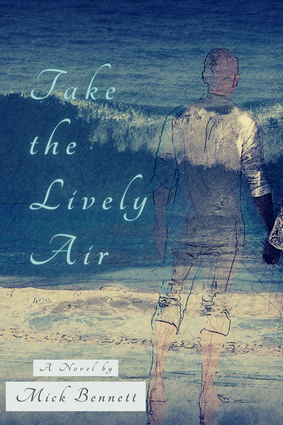 Take the Lively Air is a powerful tale of overlapping lives, the intersection of past and present, and ghosts who reside all too easily in the hearts of the living. In the course of a single day, strangers become both friends and enemies. Mistakes made, lingering doubts, and relentless remorse weave through the narrative like a ragged strand of missed opportunities and chances. Set against the glorious backdrop of the New Jersey coast, one man confronts devastating loss by offering comfort to those he may have wronged in a minor traffic accident whose consequences are both unforeseen and deeply painful. Bennett gives us a fine novel that shows how compassion triumphs over rage, and kindness always saves the day. – Anne Leigh Parrish, author of an open door "Take the Lively Air is a thoughtful and realistic portrait of modern families. Bennett is unafraid to take on tough and touchy subjects with empathy and honesty. With prose as vibrant as its New Jersey beach setting, the simmering tension will have readers flipping pages. More than a family drama, it's an examination of the complexities of excavating buried grief and regret, and a map for how to move forward." – Meagan Lucas, author Songbirds and Stray Dogs, and Editor-in-Chief of Reckon Review. “Crafted with just the right details, understated humor, and empathy, Take the Lively Air is a simple yet startling novel. Out of a single incident—two headstrong men colliding their cars in a seaside New Jersey town—emerges a universe of multilayered characters and interconnected truths. Mr. Bennett reminds us that everybody has a story, and that some of those stories lead to healing.” – Jay Kristensen Jr In Take the Lively Air, a minor traffic collision escalates into a confrontation between two families haunted by their pasts and apprehensive of their futures. Rage and regret butt heads against the background of America’s toxic cultural climate. But saner voices discover that human frailties are best viewed through the microscope of compassion, and our common humanity must be acknowledged to make way for our futures. ABOUT THE AUTHOR Mick Bennett is from Belmar, New Jersey. Bennett attended Gettysburg College, and after graduation in 1975, found a job at a high school 15 miles from Gettysburg where he taught for 33 years. Bennett is the author of four books: Missing You in Belmar NJ, Summer Mirrors, Boardwalk Man, and Beat the Blues. ABOUT THE PRESS Unsolicited Press strives to produce exceptional works of fiction, nonfiction, and poetry from award-winning authors. Unsolicited Press is based out of Portland, Oregon and focuses on the works of the unsung and underrepresented. As a womxn-owned, all-volunteer small publisher that doesn’t worry about profits as much as championing exceptional literature, we have the privilege of partnering with authors skirting the fringes of the lit world. We’ve worked with emerging and award-winning authors such as Shann Ray, Amy Shimshon-Santo, Brook Bhagat, Kris Amos, and John W. Bateman. Learn more at unsolicitedpress.com. Find us on twitter and Instagram, @unsolicitedp. TAKE THE LIVELY AIR is available on September 26, 2023, as a paperback (322p.; 978-1-956692-66-2) and e-book (all major retailers). Retailers, schools, and libraries can order copies through Ingram. The author is open to speaking with the media, holding readings, and engaging in other author opportunities. 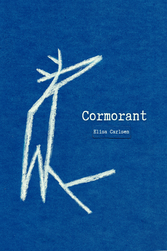
Cormorant is a work of contrition. The poems are political and personal. A response to the federal government’s plan to kill thousands of cormorants in the name of salmon recovery and a tribute to the person who died from heartbreak because of it.
To support wildlife, we are donating the profits of this book to The Wildlife Center of the North Coast. ABOUT THE AUTHOR Elisa Carlsen (she/they) grew up in Humboldt County, Nevada. They are an outsider poet and artist whose work has appeared in SixFold, VoiceCatcher, Anti-Heroin Chic, Nevada Arts Council, Brushfire, and Oranges Journal. Elisa won the Lower Columbia Regional Poetry Contest and was a finalist for the Editor’s Prize at Harbor Review. Elisa is a poetry editor for New American Press. Cormorant (Unsolicited Press, 2023) is her first published poetry collection. ABOUT THE PRESS Unsolicited Press strives to produce exceptional works of fiction, nonfiction, and poetry from award-winning authors. Unsolicited Press is based out of Portland, Oregon and focuses on the works of the unsung and underrepresented. As a womxn-owned, all-volunteer small publisher that doesn’t worry about profits as much as championing exceptional literature, we have the privilege of partnering with authors skirting the fringes of the lit world. We’ve worked with emerging and award-winning authors such as Douglas Cole, Amy Shimshon-Santo, Brook Bhagat, Tara Stillions Whitehead, Darci Schummer, and John W. Bateman. Learn more at unsolicitedpress.com. Find us on twitter and Instagram, @unsolicitedp. CORMORANT is available on September 19, 2023, as a paperback (48p.; 978-1-956692-67-9) and e-book (all major retailers). Retailers, schools, and libraries can order copies through Ingram. The author is open to speaking with the media, holding readings, and engaging in other author opportunities. 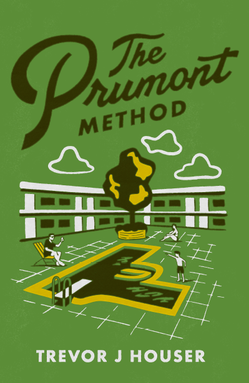 “A novel filled with gallows humor that’s representative of great creativity, The Prumont Method examines the phenomenon of gun massacres with pathos and profundity.” --Foreword, starred review THE PRUMONT METHOD is a darkly funny story capturing the wild last gasp of a family in retrograde against the backdrop of gun violence run amok in America. Staring down the barrel of a crumbling career and imploding marriage, "math hobbyist" Roger Prumont, unwittingly creates a formula that might predict when and where the next mass shooting occurs. He hits the road (where he’s joined by his unimpressed daughter) to test whether the Method could actually save lives, except he might just be risking his own in the process. PRAISE FOR THE PRUMONT METHOD "This book is funny, sad, and weird in all the best ways. It's a unique take on our gun massacre culture—briskly paced and unflinchingly digging into big questions about heroism, helplessness, and holding it all together." - Tom McAllister, author of How to Be Safe “Is it harder to predict the future or understand the past? Roger Prumont is many things—a tortured husband, a loving father, a failed marketer, an amateur bartender, an unorthodox mathematician—and The Prumont Method is a sad, lovely portrait of his struggle to make it all make sense. Read this book for its sideways humor and straight-on truth-telling.” - Karl Iagnemma, author of On the Nature of Human Romantic Interaction and The Expeditions "Trevor J. Houser has the rare ability to deliver what very few authors can: a wholly unique, almost magical brand of storytelling that’s the perfect blend of concision, humor, pathos, beauty, and utter irreverence. If Jenny Offill and Salinger had teamed up to write a novel about such a dark and rich premise, it would’ve been The Prumont Method." - Glenn Rockowitz, author of Rodeo in Joliet and Cotton Teeth “I’m not sure how Trevor Houser did it, but he found a way to talk about school shootings, failed marriages, abstract mathematicians, and middle-aged suicide in a way that is strangely heartwarming, relatable, and absolutely laugh-out-loud funny. The Prumont Method is buoyed by a meticulously crafted character and voice, and it unfolds in bite-sized sections of thoughts and musings that propel us toward a seat-clutching finale. I loved this book. And it has forever changed the way I will think about real estate agents named Kevin.” -Josh Denslow, author of Super Normal and Not Everyone is Special ABOUT THE AUTHOR Trevor J. Houser lives with his family in Seattle. He has published stories in Zyzzyva, Story Quarterly and The Doctor TJ Eckleburg Review, among others. Three of his stories were nominated for the Pushcart Prize. ABOUT THE PRESS Unsolicited Press strives to produce exceptional works of fiction, nonfiction, and poetry from award-winning authors. Unsolicited Press is based out of Portland, Oregon and focuses on the works of the unsung and underrepresented. As a womxn-owned, all-volunteer small publisher that doesn’t worry about profits as much as championing exceptional literature, we have the privilege of partnering with authors skirting the fringes of the lit world. We’ve worked with emerging and award-winning authors such as Douglas Cole, Amy Shimshon-Santo, Brook Bhagat, Tara Stillions Whitehead, Darci Schummer, and John W. Bateman. Learn more at unsolicitedpress.com. Find us on twitter and Instagram, @unsolicitedp. THE PRUMONT METHOD is available on August 15, 2023, as a paperback (240p.; 978-1-956692-49-5 and e-book (all major retailers). Retailers, schools, and libraries can order copies through Ingram. The author is open to speaking with the media, holding readings, and engaging in other author opportunities. Please contact Mindbuck Media to book the author. Announcing the Immediate Release of Darci Schummer's Newest Novel, THE BALLAD OF TWO SISTERS8/8/2023
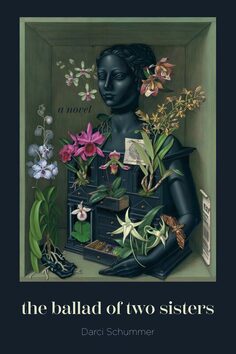 At the center of The Ballad of Two Sisters are Stella and Helen, two sisters who die on the same day. One fragile and one strong, the sisters confront the troubles of the past and the uncertainty of the future as they seek connection, joy, and completion. Though at times circuitous, the paths the sisters travel ultimately lead them back to each other, until finally, they can never be parted. PRAISE FOR THE BALLAD OF TWO SISTERS "A rich and absorbing read, Darci Schummer’s story of sisters Stella and Helen – one fragile and one strong – is a double helix of individual and very different lives bound by love and blood, spiraling from their difficult childhood through jobs, marriage, children, and aging. What a lovely book of broken, revitalized, and beautiful hearts." -Linda LeGarde Grover, author of In the Night of Memory "A dark and haunting family saga, The Ballad of Two Sisters spirals around identity with details that pull you hard into the smallness of Midwest America. Schummer’s writing is emotional and her storytelling gets deep into your head, making you forget you’re reading. She’s dreamy and eclectic and smooth and easy. Time spent with this book will certainly enrich your life." -Raki Kopernik, author of The Things You Left and The Memory House ABOUT THE AUTHOR Darci Schummer hails from the village of Fall Creek, Wisconsin. Primarily a fiction writer, she is the author of the story collection Six Months in the Midwest (Unsolicited Press), co-author of the poetry/prose collaboration Hinge (broadcraft press), and author of the forthcoming novel The Ballad of Two Sisters (Unsolicited Press). Her fiction, poetry, and essays have appeared in Ninth Letter, Folio, Jet Fuel Review, MAYDAY, Matchbook, Necessary Fiction, Sundog Lit, and Pithead Chapel, among many other places. She has been nominated both for the Pushcart Prize and Best of the Net, and her work has also been selected as a Longform Fiction Pick of the Week. In addition to writing, she teaches at Fond du Lac Tribal and Community College where she serves as faculty editor of The Thunderbird Review. She lives with her partner Tanner, pitbull Turnip, and cat Cokie Roberts in a big old house that always needs work. ABOUT THE PRESS Unsolicited Press strives to produce exceptional works of fiction, nonfiction, and poetry from award-winning authors. Unsolicited Press is based out of Portland, Oregon and focuses on the works of the unsung and underrepresented. As a womxn-owned, all-volunteer small publisher that doesn’t worry about profits as much as championing exceptional literature, we have the privilege of partnering with authors skirting the fringes of the lit world. We’ve worked with emerging and award-winning authors such as Douglas Cole, Amy Shimshon-Santo, Brook Bhagat, Tara Stillions Whitehead, and John W. Bateman. Learn more at unsolicitedpress.com. Find us on twitter and Instagram, @unsolicitedp. THE BALLAD OF TWO SISTERS is available on August 8, 2023, as a paperback (234p.; 978-1-956692-96-9) and e-book (all major retailers). Retailers, schools, and libraries can order copies through Ingram. The author is open to speaking with the media, holding readings, and engaging in other author opportunities.
Last week we revealed on Instagram that we were going to be producing a creative nonfiction anthology that will be free to submit to, and divvy up the profit between the authors selected to be in the anthology.
Let's talk about what we're looking for and when we want it. WHAT DO WE WANT This is the easy part (or maybe the hardest!!!). The theme is that there is no theme. We want essays about writing, writing life, craft, and experiences in the writing world. The only requirement is that they are well-written, researched, and honest. These essays must be original and not previously published (please do not attempt to recycle something and send it to us). We would like essays that are less than 10 pages in length. Please submit as a Word document or PDF. WHEN DO WE WANT IT The submissions period opens July 31, 2023 and closes on November 1, 2023. We are asking that writers submit their works to us through Stacks Submission Manager. It's free to use. This is a new software that we are potentially transitioning over to for our year-round book submissions. If you are unable to submit your work through the new submissions manager, please use this FORM instead. You will hear back from us in January 2024. The goal is to have it ready to publish in July 2024. PORTLAND, OR -- JULY 18, 2023: Unsolicited Press announces the immedite availability of Josh Ranks novel, THE PRESENT IS PAST. Mary's growing dementia not only ends her teaching career, but also leads to her losing the family dog. The patience that has kept their marriage afloat for 39 years gives way to the stress as her husband suffers a heart attack.
Their adult children attempt to help out but it's difficult to accept that your parents will die one day--and that day might be soon. Mary finds herself drawn to a specific place. And as strangers inexplicably tell her, she just needs to figure out where that is while she still can. The family must choose between finding a new way to support themselves and helping Mary make one last salient memory while it's still possible. And they must do this while the sun burns out, flocks of birds fall dead from the sky, and buildings full of people disappear in an instant. ABOUT THE AUTHOR Josh Rank graduated from the University of Wisconsin - Milwaukee before moving to various cities around the country only to return to his hometown. His fiction has appeared in The Emerson Review, The Feathertale Review, Hypertext Magazine, and elsewhere. He keeps himself busy putting together ugly woodworking projects, cooking for his wife, and wishing his dogs were better behaved. THE PRESENT IS PAST is available on July 18, 2023 , as a paperback (340p.; 978-1-956692-55-6) and e-book (all major retailers). Retailers, schools, and libraries can order copies through Ingram. The author is open to speaking with the media, holding readings, and engaging in other author opportunities. 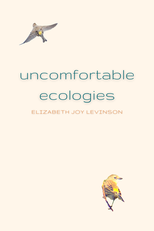 Uncomfortable Ecologies is an exploration of relationships and their tenuous nature. Levinson explores the domestic and wild, the macro and the micro, the familiar and the other, the objective and the confessional. These poems seek to uncover vulnerabilities within ecologies as a bridge to a new level of understanding and intimacy. PRAISE FOR UNCOMFORTABLE ECOLOGIES Insects, jellyfish, wild horses, hurricanes. Shark teeth and coyotes. Sisters who wait tables. Men who go to sea then come home to dance with our mothers in the family kitchen. These are some of the living, breathing ties that keep a body tethered to place. This collection teems with a longing for connection to the natural world. It asks, “How does a person come to belong?” and it answers again and again that if connection is indeed possible, it is only in moments where we recognize ourselves in what’s considered other, that the moments are fleeting as silverfish across a bare floor. Are we comfortable with discomfort? Can we look in the mirror? When the long-tailed weasel shows us its prey, do we dare keep our eyes open? --L.I. Henley, Starshine Road (Perugia Press) ABOUT THE AUTHOR Elizabeth Joy Levinson is a high school teacher in Chicago, where she lives with her husband & pets. She has an MFA from Pacific University and an MAT in Biology from Miami University. She is the author of two chapbooks, As Wild Animals (Dancing Girl Press) and Running Aground (Finishing Line Press) and has had work published in many independent journals. ABOUT THE PRESS Unsolicited Press strives to produce exceptional works of fiction, nonfiction, and poetry from award-winning authors. Unsolicited Press is based out of Portland, Oregon and focuses on the works of the unsung and underrepresented. As a womxn-owned, all-volunteer small publisher that doesn’t worry about profits as much as championing exceptional literature, we have the privilege of partnering with authors skirting the fringes of the lit world. We’ve worked with emerging and award-winning authors such as Douglas Cole, Amy Shimshon-Santo, Brook Bhagat, Tara Stillions Whitehead, and John W. Bateman. Learn more at unsolicitedpress.com. Find us on twitter and Instagram, @unsolicitedp. Uncomfortable Ecologies is available on July 18, 2023, as a paperback (100p.; 978-1-956692-60-0) and e-book (all major retailers). Retailers, schools, and libraries can order copies through Ingram. The author is open to speaking with the media, holding readings, and engaging in other author opportunities. As a small press there are a lot of expenses to keep up with and not a lot of money left in the coffers after we've produced a book. Recently, we decided to add a few new revenue streams to help continue our mission to make the best possible books written by exceptional authors without having to take money from investors who would rather make loads of money than focus on publishing books by the underrepresented and unsung writers of our time who are all about creating art first and product second. Our team wants to preserve the edgy, funky, eclectic, foul-mouthed, and most of all, cooperative venture that is this company.
Our books sell. That's a fact. And many of our books sell out of their initial print runs because we have a very loyal fan base. But those sales rarely cover more than the cost to produce the book and bring it into the world. A book's profit is getting smaller and smaller every year with the rising costs of ink, paper, shipping, and warehousing, not to mention, other fees that continue to rise. Because of the rising costs, we came up with new ways to help support the press by offering different avenues for our supporters to help us continue our publishing mission. It's also important for us to be transparent, which is why we're writing this post to tell you where the money is going. Let's dive into the financial ways to help support us: DONATIONS Donations have always been used to cover operations and production, and, if there is any leftover, advertising and marketing get some cashflow. When it comes to making and sustaining a book, we use the profit from the sales of books first, and then use donation funds. These donations are very important because without them, we couldn't produce as many books or dedicate the resources it takes to make a book perfect. MERCHANDISE Very recently, we decided to start offering merchandise such as clothing, tote bags, etc. online instead of just at book festivals and conferences. For years, we've been asked to do this. Finally, we had some time to give to this project. The profit from the sales of any merchandise goes directly to the PR, marketing, and advertising of our titles. Like most small presses, the budget for advertising and PR is small, so we are hoping that the profit from the merchandise will exponentially increase our ability to reach new readers. Just last week, we made enough to begin advertising directly on Instagram and that brought us several new readers as well as followers. NEWSLETTER SUBSCRIPTIONS Another item that we recently started was a Substack newsletter with a free and paid option. All proceeds from the paid newsletter further the press's mission to become a name brand small press. What does that mean? Well, it means to continue up the ladder that is the publishing world, we need funds that allow us to get our books in front of book influencers and those who have the potential to help us get to the next level. If you are subscribing, donating, or buying our merchandise, we consider you part of the press. Supporters (this includes readers of our books and the writers that trust us) of the press are integral in keeping Unsolicited Press moving forward. It's been nearly eleven years since we started the press and we'd like to elevate the press in the next five years. We can't do that without you. Thank you for reading. Thank you for supporting us in whichever way you do. If you're ever in Portland, one of our team members will be happy to buy you a cup of coffee or a beer or a lemonade and talk about everything and nothing. We are excited to announce new merchandise is available. From shirts to bags to stickers to coffee mugs, we've got something for everyone.
All of the proceeds go toward funding the marketing and PR plans for our titles. Check it out!
It's the last day to get free shipping and a tote bag (for orders $100+) on Bookshop.org. Consider getting $100 worth of our books! If you do & share a pic of your swag and books, we'll send you an invite to an exclusive reading this winter.
Here are some our most popular books right now: PORTLAND, OR -- JULY 11, 2023: A rust belt city in decline retains the solace of romance, which often proves to be an empty promise or even a curse. With a wry perspective and unflappable determination, Curt embodies all the town’s ills, including his own problems with drinking, work, and relationships, as he tries to save himself and rescue his friends in his own unconventional and unlawful ways. In The Bridge on Beer River, a novel-in-stories set in Reagan-era Binghamton, New York, characters scramble for subsistence while hoping for love and a better life.
PRAISE FOR TERRY TIERNEY The characters in The Bridge on Beer River drink too much, fight for survival, and fight one another while clinging to friendship and humor. Terry Tierney plies the blue-collar desperation and heroism of William Kennedy with fast-moving prose reminiscent of Raymond Chandler! Lee Kravetz, author of The Last Confessions of Sylvia P. As Curt, an ex-Marine living in Reagan-era Binghamton, NY, struggles to find his way, he crosses paths with colorful down-and-outers, sharp women, and hardened characters. With his heart in the past but his eye on the future, he tries to improve himself by learning computer technology at the dairy which eventually lays him off. Down on his luck again, and short on cash, he makes do by working for a local bookie in between beers at his favorite bar. Others offer money, advice, and the use of a battered set of wheels, but only Curt can help himself. Then, a chance to flee the industrial decay of upstate New York comes his way, but will he take it? Written in tight, unsentimental prose, with wry, crackling dialog, The Bridge on Beer River reminds us of the value of friendship, believing in yourself, and the lure of that one big gamble that could really pay off. Anne Leigh Parrish, author of An Open Door Reading Terry Tierney’s novel-in-stories, The Bridge on Beer River, is to remember what I love about fiction. Tierney does, in fact, tell tales, but he tells them with a writerly voice that can only result in that most precious outcome: honest deception. He builds a bridge between perspectives, between moments and crises, between characters, between writer and reader, and continuously—relentlessly—reminds me that a bridge is very rarely crossed just once. And there is, especially in the upstate New York of this novel, always a toll to be paid. Tierney creates a nearly perfect antihero in Curt, the lager-swilling, B-list Romeo who channels the best bits of Bukowski and James Dean. Likewise, the author creates a reality so convincing and inescapable that as the novel progresses, I stupidly hope the world is not ending. I begin to root for more breakups, more hangovers, more derelict dreams. And, as Tierney so masterfully uses as a visual metaphor, more African violets. Tierney has written a human novel, free of self-importance and pretense. This is a gripping book by one of the finer fiction writers I know. Andy Smart, author of The More You Hate Me ABOUT THE AUTHOR Terry Tierney was raised in Minneapolis and eventually migrated to the San Francisco Bay Area. After serving in the Seabees, he completed his BA and MA at Binghamton University, and earned a PhD in Victorian Literature at Emory University. He taught college composition and creative writing, and he survived several Silicon Valley startups as a software engineer. He lives in Oakland with his wife, a Librarian from the University of California, their two Persian cats, and their enthusiastic Golden Retriever. He is the author of a poetry collection, The Poet’s Garage, and the novel Lucky Ride, both published by Unsolicited Press. His work has appeared in many literary journals and anthologies. More can be learned at http://terrytierney.com. The Bridge on Beer River is available on July 11, 2023 , as a paperback (374p.; 978-1-956692-63-1) and e-book (all major retailers). Retailers, schools, and libraries can order copies through Ingram. The author is open to speaking with the media, holding readings, and engaging in other author opportunities. 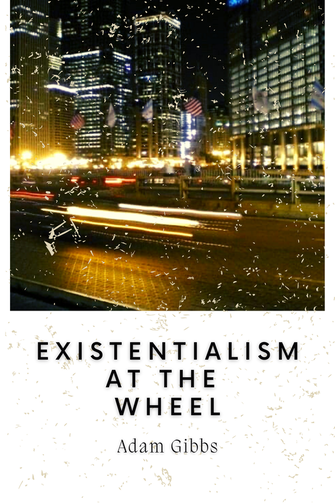
ABOUT THE AUTHOR Adam Gibbs is an author and poet from Grove City, Ohio. His writing has appeared in Black Bough Poetry, The Mark Literary Review and Second Chance Lit. His novella, Dumb Luck, is available from Unsolicited Press. He lives with his wife Lindsay and their two children, Clara and Isaac. ABOUT THE PRESS Unsolicited Press strives to produce exceptional works of fiction, nonfiction, and poetry from award-winning authors. Unsolicited Press is based out of Portland, Oregon and focuses on the works of the unsung and underrepresented. As a womxn-owned, all-volunteer small publisher that doesn’t worry about profits as much as championing exceptional literature, we have the privilege of partnering with authors skirting the fringes of the lit world. We’ve worked with emerging and award-winning authors such as Shann Ray, Amy Shimshon-Santo, Brook Bhagat, Kris Amos, and John W. Bateman. Learn more at unsolicitedpress.com. Find us on twitter and Instagram, @unsolicitedp. Existentialism at the Wheel is available on June 20, 2023 , as a paperback (70p.; 978-1-956692-70-9) and e-book (all major retailers). Retailers, schools, and libraries can order copies through Ingram. The author is open to speaking with the media, holding readings, and engaging in other author opportunities. Powerhouse Essayist Sarah K. Lenz Publishes "What Will Outlast Me?" with Unsolicited Press6/13/2023
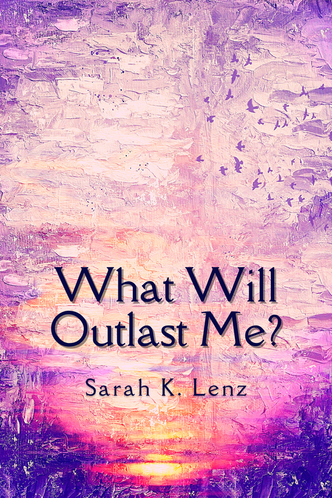 In her debut essay collection, Sarah K. Lenz explores the question: How do you live knowing you’re going to die? Lenz touches on moments when death brushed near, including a house fire, a car accident, and a police shooting, but in each case, the violent and tragic are interwoven with curiosity and insight. With clarity and grace, Lenz takes on a wide-ranging of topics. From the discovery of a post-mortem photograph of her great-uncles who were killed by lightning to the quotidian pancaking-making days with her preschooler son while the COVID-19 pandemic raged, Lenz confronts the complexities of being sandwiched between aging parents and a young child, while also navigating her own thyroid cancer diagnosis. In the midst of this, Lenz finds herself comforting her father, who’s fixated with where to spread his ashes in “Driving the Section Line, ” and imagining all the ways her baby can die when suffering postpartum depression in “So Many Ways.” Though the subjects are serious, often life or death matters, Lenz tells these stories with warmth and wisdom. The narrative is buoyed by breathtaking honesty—and a bit of the grotesque–like a misguided attempt to cook a whole hog’s head from her beloved, late grandmother’s recipe. This book is a moving, heartfelt meditation on how to face mortality, how to grieve, but most importantly, how to awaken to the ephemeral beauty of the world. This book is a powerful reminder that what will outlast us is those we love. ABOUT THE AUTHOR Sarah K. Lenz grew up in central Nebraska. Her creative nonfiction has appeared in Colorado Review, New Letters, Triquarterly, The Fourth River, Pen Dust Radio and elsewhere. Her work has been named Notable in Best American Essays three times. She writes the newsletter Spirit: Notes for the Creative Contemplative. Sarah is an Assistant Professor of English at Del Mar College in Corpus Christi, Texas where she lives with her husband, son, and twelve typewriters. Find her online at sarahklenz.com. ABOUT THE PRESS Unsolicited Press strives to produce exceptional works of fiction, nonfiction, and poetry from award-winning authors. Unsolicited Press is based out of Portland, Oregon and focuses on the works of the unsung and underrepresented. As a womxn-owned, all-volunteer small publisher that doesn’t worry about profits as much as championing exceptional literature, we have the privilege of partnering with authors skirting the fringes of the lit world. We’ve worked with emerging and award-winning authors such as Shann Ray, Amy Shimshon-Santo, Brook Bhagat, Kris Amos, and John W. Bateman. Learn more at unsolicitedpress.com. Find us on twitter and Instagram, @unsolicitedp. "What Will Outlast Me?" is available on June 13, 2023 , as a paperback (252p.; 978-1-956692-53-2) and e-book (all major retailers). Retailers, schools, and libraries can order copies through Ingram. The author is open to speaking with the media, holding readings, and engaging in other author opportunities. If you could cook dinner for any author, dead or alive, who would it be? What would you make?
Virginia Woolf because I know she appreciated fine dining, and I’d want to show off a little because I love cooking. She’d get behind some good charcuterie. If you’ve read my essay “Making Headcheese,” then you know I can make Hog’s Headcheese from a whole pig’s head. What scares you the most about the writing process? How do you combat your fears? As a memoirist, it’s difficult when you write about real people in your life, and they react badly to it. It’s hard to tell what might upset someone. For What Will Outlast Me?, my family was supportive. I had my mom and my mother-in-law vet the chapters about them before the book went to publication. My mom suggested changes that made the essay stronger, and portrayed her experience with having cancer more accurately. I changed some names real people to protect their privacy. What books are on your nightstand? Under My Bed by Jody Keisner, Smile: the story of face by Sarah Ruhl, Ordinary Insanity: fear and the silent crisis of motherhood in America by Sarah Menkedick, and Plums for Months by Zaji Cox. Favorite punctuation mark? Why? I love the em dash because it mirrors my thought process. Often a rogue idea appears–and demands to be inserted into my original train of thought–before I can finish the sentence. (I hate semicolons; they’re just a pretension; they try too hard to string together ideas; they want too much attention.) What book were you supposed to read in high school, but never did? Augustine’s Confessions. What inanimate object would you thank in your acknowledgements? B5-Size Composition Notebooks made by Zen Art (I use them for my morning pages journal, my drafts in progress, and my Bullet Journal). Lamy Safari fountain pens filled with Noodler’s Black, Bulletproof ink. Wide-brimmed straw sun hats I wear when I go on “thinking-walks” to take writing breaks,. Diet Coke, but when drinking too much Diet Coke gives me an IBS flare, then I have to switch to unsweetened iced tea. Does writing energize or exhaust you? Exhausts, but in a good way. I like to balance the headiness of writing with physical activities. After several hours of writing, I’ll clear my head with swimming laps or long walks. I spent a lot of time going on walks on the trash-strewn public beach that I wrote about in the essay, “From Birth to Bone,” when I was finishing up the last essays in What Will Outlast Me? What is your writing Kryptonite? Grading Freshman Composition Papers. I really enjoy being an English professor, and I admire and respect my students. My students often write about interesting things, but there’s no way around it, grading a batch of 100+ research essays takes a lot of energy. I can’t write when I’m in paper-grading mode. A grading cycle takes about 4 or 5 days, 4 times a semester, so there are in-between times when I can write more. I’m incredibly lucky to be tenured on a 9-month teaching contract, so I get a lot of writing done in the summers, especially when the heat index in south Texas is 100-110 degrees in July and I never want to go outside. Have you ever gotten reader’s block? Reader’s block for me looks like promiscuous reading. I’ll have dozens of one-night stands in a row, in which I sit down and read for an hour–get 50 or 75 pages in–and then completely lose interest (you know, and sneak out before they wake up and want breakfast.) I have phases of being totally unable to commit to reading a whole book. Do you think someone could be a writer if they don’t feel emotions strongly? Yes, but a pretty sophisticated level of emotional intelligence is necessary. Just the other day I was at a pool party with a good mix of parents all with kids and a friend asked: Do you think adults are capable of feeling emotions as strongly as kids do? He’d noticed his daughter, who’s 6-years-old, like my son, has ghastly emotional outbursts and concluded he’d never felt that strongly as an adult. I argued that we all feel the same intensity of emotion (and how would you even measure objectively?). It’s just that as adults we have experience and logic and a set of well-honed coping mechanisms so it doesn’t look like the emotions are as strong from the outside, even though inside they are. I think that’s the thing that writing does better than any other art form: it gets into the character’s inner emotional life, and when you're a memoirist, that character is a past version of yourself. What authors did you dislike at first but grew into? Joan Didion, David Foster Wallace What’s your favorite under-appreciated novel? Willa Cather’s Song of the Lark. It’s just as good as O Pioneers!, but even better than My Antonia, but it never gets any love. How many unpublished and half-finished books do you have? Two. One’s a drawer novel I started during the pandemic. I wrote it in long-hand in B5 notebooks with cats on the covers, and I have no inclination to ever finish it. The other unfinished book is a memoir manuscript I’m working on now, which is about how diet culture, and generational trauma related to eating disorders, screwed up many of my relationships. What does literary success look like to you? To keep writing the best books I can and to have readers who connect with my work. What did you edit out of this book? At one point, I cut half this book manuscript. The essays that got cut just weren’t working thematically. They were mostly about sex (the story of how I lost my virginity/dating someone with different turn-ons, stuff like that.) In this case, sex did not sell. Lol. If you didn’t write, what would you do for work? My day job is teaching writing as a college professor, and I love teaching. It allows me to follow my curiosity and practice the writing process, which makes my writing better. Currently, I’m designing a literature course devoted to the contemporary essay and the reading list is all my favorite modern nonfiction writers: Eula Biss, Amy Fusselman, Ross Gay, Maggie Nelson. Upcoming Promotions to Celebrate the Launch of Terry Tierney's Book THE BRIDGE ON BEER RIVER6/1/2023
Unsolicited Press has had the pleasure of working with Bay Area author Terry Tierney for years, first with his poetry collection The Poet's Garage, then his novel Lucky Ride, and now with his latest novel-in-stories, The Bridge on Beer River.
In The Bridge on Beer River, set in Reagan-era Binghamton, New York, a rust belt city in decline retains the solace of romance, which often proves to be an empty promise or even a curse. With a wry perspective and unflappable determination, Curt embodies all the town’s ills, including his own problems with drinking, work, and relationships, as he tries to save himself and rescue his friends in his own unconventional and unlawful ways. To celebrate the launch of Terry's latest book (out on JULY 11, 2023), we are offering a few cool promotions. EBOOK PROMO For the first 100 copies sold on our website we will give out free ebook copies of Terry's first novel, LUCKY RIDE. Also, for those who want to buy a copy of BRIDGE off-site, then you can find ebook copies of LUCKY RIDE at a discount on your favorite ebook retailer's website (just $2.99). EVERYTHING TERRY TIERNEY BUNDLE Maybe you are itching to read everything we've published by Terry....because after all, he's a stellar writer and all-around good person. We made it so you can get all of his titles from us for a steal. Grab the book bundle! It's $40 plus shipping and you get three paperbacks. GIVEAWAY Any reader who posts a picture of them with their copy of BRIDGE on Instagram or Twitter will be entered to win a free book of their choice. Don't forget to tag @unsolicitedp in the picture. |
Popular Topics
All
We Support Indie Bookshops |
